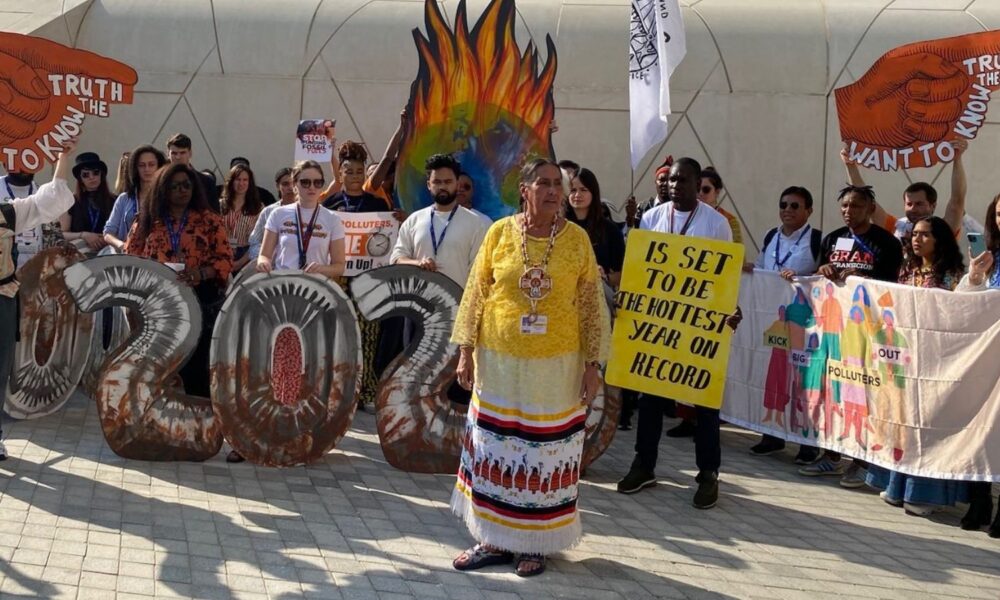December 5, 2023
 RACHEL CLEETUS/UCS
RACHEL CLEETUS/UCSFossil fuel industry influence has been front and center in the UN international climate negotiations—the 28th conference of the parties (COP28)—in Dubai, United Arab Emirates. This is alarming but not surprising, given that the nations of the world are finally working toward an agreement to phase out fossil fuels. They know it’s the end of the fossil fuel era, and they’re showing up in force because they’re scared. Vested interests of the fossil fuel industry are pulling out all the stops by co-opting leadership roles, flooding the official negotiating space with lobbyists to water down text, and attempting to distract negotiators with bogus voluntary initiatives. Clearly, talk of a fossil fuel phaseout is striking a nerve.
Now the nations of the world must meet the moment in Dubai to agree to a fast and fair phaseout of all fossil fuels (coal, oil, and gas), something more than 650 scientists urged President Biden to champion in a letter sent last month. It will certainly not be easy, but it is essential to limit the worst impacts of climate change, accelerate the clean energy transition, and build a healthier, safer, more just world.
Fossil Fuels and Climate: Conflicting Interests
It’s well known that there are serious conflict of interest issues with the head of this year’s talks, Sultan Al-Jaber, who is also the head of an oil company. On the eve of the talks, leaked internal documents revealed that the United Arab Emirates planned to use its role as the host of COP28 to pursue oil and gas deals.
Science shows that that fossil fuels are by far the largest contributor to human-caused climate change. Despite recent statements to the contrary, a fast and fair fossil fuel phaseout is really the only option to limit climate change damage and safeguard people’s health, lives, and livelihoods. There’s no room for the fossil fuel industry’s well-worn playbook of distraction, deception, and delay.
In fact, fossil fuel industry influence at COP has been the rule, not the exception. A recent analysis by the Kick Big Polluters Out coalition found that lobbyists and other representatives of the biggest polluting oil and gas firms have attended UN climate talks at least 7,200 times over the past 20 years.
ExxonMobil Chair and CEO Darren Woods’s unprecedented presence here at COP28 is part of the corporation’s campaign to regain its social license. By showing up at climate talks, Woods is attempting to convince decisionmakers, the public, and investors that his corporation is part of the solution for climate change (although he revealed his determination to preserve fossil fuel business as usual when he complained that the talks have focused on renewable energy for too long).
But Woods is far from alone. He is among a record 2,456 fossil fuel industry lobbyists here. According to a new analysis of the COP28 participants list by the Kick Big Polluters Out coalition:
- Fossil fuel industry representatives outnumbered almost every country delegation to COP28.
- There are more fossil fuel lobbyists than delegates from the 10 most climate vulnerable nations combined, and seven times as many fossil fuel lobbyists as official Indigenous representatives.
Thanks to civil society organizing, new rules requiring participants to disclose who they represent have increased transparency at COP28. But this year’s eye-popping figure—nearly four times the number of fossil fuel lobbyists at COP27—is likely an undercount, because delegates can still hide their ties to fossil fuel interests.
More Empty Promises from the Oil and Gas Industry
How does all this influence play out? Among the flurry of announcements in the first days of COP28 is the Oil and Gas Decarbonization Charter. Led by the president of this year’s talks, the charter is a voluntary initiative by oil and gas corporations. Don’t be fooled by the hype. The charter largely restates woefully insufficient emissions-reduction pledges already made by investor-owned fossil fuel corporations while bringing some national oil companies under its umbrella.
More than 320 organizations on six continents published a letter rejecting the charter as a greenwashing ploy and calling on the COP presidency to drop the charter and instead focus on working within the COP process to secure a legally binding energy package that includes a fossil fuel phaseout, triples renewable energy, and doubles energy efficiency.
According to the COP president, 50 companies representing 40 percent of global oil production have signed onto the charter, announced as part of a broader Global Decarbonization Accelerator. Major corporations, including BP, ENI, ExxonMobil, Shell, and TotalEnergies, signed the initiative. Many of the investor-owned oil and gas corporations signing the charter already claim to be aligned with the goals of the Paris climate agreement and have pledged to reach net-zero global warming emissions by 2050. National oil companies represent 60 percent of the signatories.
The charter covers only operational emissions. While reducing operational emissions is necessary, and it’s low-hanging fruit that can help limit the worst impacts of climate change, it is far from sufficient. The lion’s share of oil and gas sector emissions (80 to 90 percent for most oil and gas corporations) come when their products are burned. That is their intended and inevitable use when producers extract and process them, and it is the driver of company profits.
Oil and gas corporations want the public and policymakers to focus on emissions, not fossil fuels. We’re getting that spin from ExxonMobil’s Darren Woods. Unfortunately, the US government is singing the same tune. ExxonMobil and other oil and gas corporations tout technologies such as carbon capture and storage (CCS) and schemes to trade and offset their global warming emissions. But such approaches are no substitute for steep cuts in emissions from fossil fuel production and use, and they cannot make a meaningful contribution to the reductions that are needed in the crucial time frame between now and 2030. Furthermore, CCS cannot stop air, water and land pollution from extracting, refining, distributing, burning, and disposing of fossil fuels, all which disproportionately harm low-income people, communities of color, and Indigenous peoples in the United States and the Global South.
Stop the Greenwashing Game
There is a real risk that the Oil and Gas Decarbonization Charter only serves to launch a new era of greenwashing cross-pollination between transnational investor-owned oil and gas corporations and national oil companies. That would be bad news, and only compound the climate crisis. Since the 2015 adoption of the Paris climate agreement, we’ve seen BP, Chevron, ExxonMobil, and Shell aggressively expand oil and gas exploration and production while claiming to be part of the solution for climate change.
This public relations onslaught includes paid advertising in traditional and social media, glossy climate reports, voluntary and selective disclosures, and emission-reduction targets misleadingly framed to appear significant while justifying business as usual. Big Oil’s deception campaign is increasingly becoming a legal liability, fueling a rising tide of climate litigation, as California Attorney General Rob Bonta told COP28 participants. But scrutiny from public prosecutors and investors hasn’t stopped the industry from aggressively lobbying against mandatory and standardized corporate reporting such as the climate disclosure rule proposed by the US Securities and Exchange Commission in March 2022 and two climate disclosure laws recently enacted in California.
Mandatory and Enforceable Obligations are Needed
The question regarding the appropriate role of voluntary initiatives within the international climate negotiations is complex. Voluntary initiatives cannot be a substitute for enforceable commitments and mandatory obligations with independent monitoring and verification—and they can even be a distraction or delay tactic.
That’s not to say voluntary initiatives have no role to play as part of an all-hands-on-deck approach to addressing the climate crisis. Increasingly, leaders from civil society, businesses, Indigenous communities, labor, and other key constituencies convene around these talks, and major efforts to ratchet up ambition and action across all sectors of society are launched at COPs.
But nations are the decisionmakers at international climate talks. They could have committed themselves to the charter’s principles years ago and required national oil companies to comply. Instead, states that are home to national oil companies have helped delay and block progress in the international climate talks for decades. The United States, heavily influenced by lobbyists for ExxonMobil and other investor-owned companies and their surrogates, such as the American Petroleum Institute and US Chamber of Commerce, also has been guilty of stalling and obstruction.
At COP28, nations are undertaking the first global stocktake to examine progress made since the adoption of the Paris climate agreement. Through this process, they could commit to hold corporations under their jurisdiction—national oil companies as well as investor-owned fossil fuel corporations—accountable to achieve the emissions reductions promised in the charter. But, in point of fact, those emissions reductions are far too little, far too late. What the world actually needs in this global stocktake is a clear international commitment to a fair, fast, and funded phaseout of fossil fuels.







